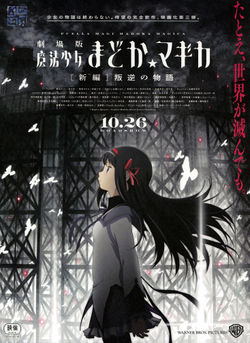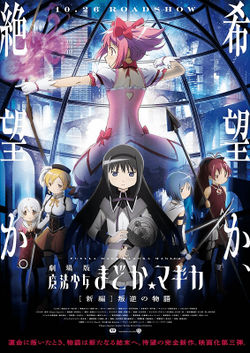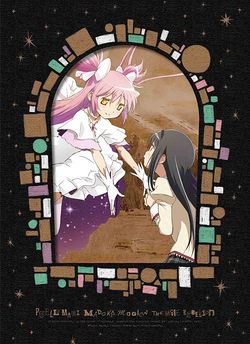Puella Magi Madoka Magica the Movie -Rebellion-
This page is missing citations. Help would be appreciated in adding sources for information.



"Even if this world will crumble as well." ~ Red text on the first Rebellion movie poster.
"Hope, or despair." ~ Large text on the second Rebellion movie poster.
Puella Magi Madoka Magica the Movie: Rebellion (劇場版 魔法少女まどか☆マギカ[新編]叛逆の物語 Gekijōban Mahō Shōjo Madoka Magika [Shinpen]: Hangyaku no Monogatari, lit. Magical Girl Madoka Magica the Movie [New Edition]: The Rebellion Story) is the third movie of the Puella Magi Madoka Magica the Movie trilogy, serving as a sequel to the story. The movie premiered in Japan on October 26th, 2013. It is 120 minutes long.
The opening theme is Colorful (カラフル) by ClariS and the ending theme is Kimi no Gin no Niwa (君の銀の庭, "Your Silver Garden") by Kalafina.
On November 12, 2013, a manga adaptation by Hanokage was released and, two years later on December 12, a prequel manga named Puella Magi Madoka Magica: Wraith Arc, also by Hanokage, was released.
Summary
See /Synopsis
Characters
- See also: Madoka Magica Characters
Madoka Kaname
Japanese text: 希望を願う魔法少女がやがては絶望し魔女になる悲劇の連鎖から、全ての魔法少女を解き放つことを願い魔法少女となる。その願いは非常に大きなものであり、まどか自身は新たなる世界の概念と化してしまった。
English translation: The magical girl who wished to release all magical girls from the tragic chain of wishing for hope as magical girls and eventually falling into despair as witches. Due to the grandiose nature of that wish, Madoka herself became a concept of the new world.
Homura Akemi
Japanese text: まどかを魔法少女にさせないため、幾度となく同じ時を繰り返した少女。理が変った世界で、まどかがいた事を唯一覚えている存在であり、その意思を継いで魔法少女として戦い続けている。
English translation: The girl who repeated time on several occasions to prevent Madoka from becoming a magical girl. In the world with its laws rewritten, she is the only being left who remembers that Madoka was there. And succeeding that will, she fights as a magical girl.
Sayaka Miki
Japanese text: まどかの親友で、幼なじみの怪我の治癒を願い魔法少女となる。幸せを祈った分、呪いをため込み魔女へと化し、杏子と共に命を散らせた。まどかの願いにより、魔女になることもなく穏やかな最後を迎えた。
English translation: Madoka's close friend who became a magical girl when she wished for her childhood friend's wounds to be healed. When she gathered an amount of curses equal to the amount of blessings she wished for, she became a witch and lost her life alongside Kyoko. Through Madoka's wish, she was greeted by a calm, peaceful final moment without becoming a witch.
Mami Tomoe
Japanese text: まどかやさやかたちの先輩にあたる見滝原の魔法少女。お菓子の魔女との戦いにおいて命を落としたが、まどかの願いによりその悲劇は消え去り、魔法少女を続けている。
English translation: A magical girl in Mitakihara who is senior to Sayaka and Madoka. She lost her life in the fight with the witch of sweets, but by Madoka's wish, that tragedy was erased, and she continues her life as a magical girl.
Kyoko Sakura
Japanese text: 隣の町からきた魔法少女。他の誰かの為に魔法を使うさやかに反発していたが、自分と似ていることから気をかけるようになる。そして、魔女と化したさやかを救うために自らの命をかけた。まどかの願いがかなえられた世界で魔法少女を続けている。
English translation: A magical girl from a neighboring town. She opposed Sayaka for using magic for the sake of others, but came to realize that the two of them were similar. And then she risked her own life to save Sayaka who had become a witch. She continues her life as a magical girl in the world granted by Madoka's wish.
Nagisa Momoe
Japanese text: 新たに現れた魔法少女。その姿は幼く、何を願い魔法少女になったのか、また何故現れたのかは一切わからない。
English translation: A new magical girl has appeared. She has a childlike appearence and what she wished for to become a magical girl or why she has appeared is not known.
Kyubey
Japanese text: 宇宙から来た謎の生き物。第二次性徴期の少女の希望から絶望への相転移エネルギーを利用する事を狙っていたが、まどかの願いがかなえられた後の世界では別の方法でエネルギー確保をねらっている。
English translation: A mysterious animal from outer space. Their goal was to use the energy converted from the change of hope to despair in pubescent girls, but in the world granted after Madoka's wish, they seek to secure energy through another method.
International releases
Rebellion has been screened in the United States, Canada, Mexico, France, Taiwan, Hong Kong, South Korea, Australia, New Zealand and Singapore. See the international screenings page for more details.
Production
As outlined in the Rebellion Guidebook "Only You", during the initial airing of Madoka Magica, Urobuchi brought to the team a plot of a potential season 2.[1] At this stage, what form the next part would take was not yet solidified, with options such as a TV or theatrical release on the table.
Speculation
- See: Community:Rebellion
Trivia
- Urobuchi planned a scenario where Homura ascended with Madoka, but was asked by director Shinbo Akiyuki and producer Iwakami Atsuhiro to come up with an ending that would allow for the continuation of the franchise.
- Rebellion Production Notes says that the Clara Dolls are the dress-up dolls that Homura used to play with.
- The first take on Homura's dialogue before the ending of the movie sounds completely different from the final product in terms of emotions. Homura's tone and feelings were toned down, as she sounded "too emotional".
- Colourful (カラフル), the opening by ClariS, gives us a hint of what is to come:
- Four girls dancing and having fun, but Homura won't join in. Instead, she only reaches her hand to grasp Madoka's. As she does, Madoka's hand turns to sand, Homura stands alone in a desert area with a throne. The final shot is Devil Homura's earring sinking in the sand.
- Homulilly's appearance in Rebellion differs greatly from her original appearance in Puella Magi Madoka Magica Portable. She appears as a huge, distorted version of Homura, with the upper half of her head replaced by a red spider lily. Her minions are twisted versions of the pigtailed Homura from the first few timelines, armed with spears. The long ribbons of the witch's dress act as flexible arms, attacking everything around her.
- The witch's hands are in manacles, and a giant guillotine rises from the ground when she begins to head towards the city. It appears that the witch is trying to reach the guillotine so she can sacrifice herself, which would free everyone else from her witch barrier. This is foreshadowed by an image of Mami and Kyoko beheading Homura in a similar guillotine as she begins to transform into Homulilly.
- The witch initially appears wearing a stereotypical witch's hat which resembles a record player, possibly as a reference to her PSP appearance, but quickly discards it to reveal the red spider lily underneath.
- Red spider lilies also appear when Homura realises she has become a witch.
- Homura appears to be masking the true forms of her minions in the new universe; in one scene Kyoko is seen feeding apples to the bird-like minions, apparently believing them to be normal birds.
- Ms. Kazuko makes a reference to the coming of an important Holiday in a foreign land and its connection to the end of the world. It is highly possible that she is referring to the November 28, 2013 Hanukkah comet, the 2014-2015 Jewish Holidays, and the return of the Biblical Savior.
- The BGM played in each girl's transformation sequence references a song from the original soundtrack:
- Mami: Salve terrae magicae
- Kyouko: Venari strigas
- Sayaka: Decretum
- Homura: Puella in somnio
- Madoka: Sagitta luminis
- Homura's hand movements and poses during her transformation scene contain gestures and poses generally used in ballet to convey story and dialogue. She uses the pleading pantomime initially (hands above her head and circling each other) before going into the "Death" position (arms straight in front, crossed at the wrists). Through her use of ballet and pantomime, Homura is asking for her death.
- There are some Grimm Fairy Tales allusions:
- Homura as Sleeping Beauty.
- A pumpkin carriage.
- The clock struck at 12.
- "God is dead" is a widely quoted statement by German philosopher Friedrich Nietzsche. Nietsche continues, "God remains dead. And we have killed him," foreshadowing the ending.
- At the bus station there are signs written in Witch Characters, they mention the Nutcracker. A possible reference to The Nutcracker and the Mouse King, a 19th century German story by E. T. A. Hoffman.
- As the Nutcracker Witch, Homully has no teeth or her teeth are familiars that chew for her. In dream interpretation, falling teeth has several significant meanings:[1]
- It reflects anxiety, a fear of rejection, sexual impotence or the consequences of getting old. Another interpretation is that teeth are used to bite, tear, chew and gnaw. In this regard, teeth symbolize power. And the loss of teeth in a dream may be from a sense of powerlessness.
- A scriptural interpretation for bad or falling teeth indicates that one is putting one's faith, trust, and beliefs in what humans thinks, rather than in the word of God.
- Many cultures, including the Hispanic and Greek cultures, believe that when you dream about loose, rotten, falling, or missing teeth, then it indicates that a family member or close friend is very sick or even near death.
- It is possible that teeth may be a reference to the Tooth Fairy. There are few details of the tooth fairy's appearance that are consistent in various versions of the myth. Usually in the West the tooth fairy is depicted as female, a type a fairy with wings. However, in Spanish and Hispanic American cultures the role of the tooth fairy is relegated to the Ratoncito Pérez (or Ratón Pérez, "Pérez Mouse" in English)) that originated in Madrid in 1894. As is traditional in some English-speaking countries, when a child loses a tooth it is customary for him or her to place it under the pillow, so that Ratoncito Pérez will exchange it for a gift. The tradition is almost universal in Spanish cultures, but takes different forms in different areas. One of the roles of Homulilly's familiars is to kill "the white rat" (which is Kyubey), perhaps this is a reference to the Ratoncito Pérez.
- The nuts could be a reference to Grief Seeds, as they look like nuts.
- Homulilly's familiars are called "Clara Dolls", Clara is the lead character's name in most of The Nutcracker ballet versions and there is the reference to killing rats in one of the familiar's card.
- A relevant set from that play by E. T. A. Hoffmann.
- In the Nutcracker fairytale, the title character also uses a tooth and then, rendered useless, thoughtlessly discarded. A fate he shares with magical girls.
- As the Nutcracker Witch, Homully has no teeth or her teeth are familiars that chew for her. In dream interpretation, falling teeth has several significant meanings:[1]
- During the final bus ride, owls pouch on clocks as they strike twelve. This is a direct reference to The Nutcracker where it marks the moment when the dolls come alive and the war between the nutcracker and the mouse king continues.
- A mare or nightmare (Proto-Germanic: *marōn; Old English: mære; Old Norse: mara; German: Nachtmahr) is an evil spirit or goblin in Germanic folklore which rides on people's chests while they sleep, bringing on bad dreams (or "nightmares"). The mare is often similar to the mythical creatures succubus and incubus, and was likely inspired by sleep paralysis.
- The mare was also believed to "ride" horses, which left them exhausted and covered in sweat by the morning. She could also entangle the hair of the sleeping man or beast, resulting in "marelocks", called marflätor "mare-braids" or martovor "mare-tangles" in Swedish or marefletter and marelokker in Norwegian.
- Hungarian folklorist Éva Pócs traces the core term back to the Greek word μόρος moros, "death".
- According to Paul Devereux, mares included witches who took on the form of animals when their spirits went out while they were in trance. Animals such as frogs, cats, horses, hares, dogs, oxen, birds and often bees and wasps.
- When Kyubey keeps Homura inside an Incubator's isolation field, he compares Homura to a baby chick, "you're a like a chick that wasn't able to break its shell and grew up within it." In Revolutionary Girl Utena, Touga Kiryuu utters a same sentiment about the students and the world.
Reviews
"The real star is the riot collage of twisty, breakneck visuals underscoring these conversations and battles: swirling ribbons, fabric-textured backgrounds, fantastical weaponry, demented childhood iconography and shape-shifting forms that create a highly tactile evocation of roiling emotions."
- LA Times
"Alternately enchanting and exhausting"
"Rebellion delivers a convoluted conclusion sure to prove beyond baffling to any franchise newcomers."
- Variety
"Rebellion is gorgeous, 21st century psychedelic eye candy." - Geek Exchange
"Beautiful and troubling." - Fandom Post
"The U.S. Premiere of Madoka Magica Rebellion had long lines, a sold out crowd and the third installment of one of the most shining beautiful animations on the genre of magical girl." - TTDILA
Gallery
See Gallery:Puella Magi Madoka Magica the Movie: Rebellion.
See also
- Puella Magi Madoka Magica the Movie: information about the first two movies of the trilogy.
- Summary of audio commentary feature
- Translation of the Witch Characters
- Rebellion Manga
- Rebellion Material Book
- Rebellion Production Note
- Movie Pamphlet
- Cake Song
- Soundtrack
- Witches Artwork
- Nightmare
- The Rebellion Story/Q&A
External links
- Official website (Japanese)
- Official Trailers (Japanese)
- Post Premiere Talk Session with Iwakami (Aniplex producer for Madoka) and Kubota (SHAFT CEO)
- Madoka Magica Title Screen Film Strip Auctions For a Crazy $41k
- Rebellion Manga Vol.1 debuts #12 on Oricon Weekly Charts and sold 48,291 copies on its initial weekend.
- AnimeAnime names Madoka: Rebellion best anime movie of 2013 [2]
- a collaboration CM for the Rebellion
- Nogizaka46 CM for Madoka Magica
- 'Madoka Magica' movie wins Kobe award.
- Madoka Magica The Movie -Rebellion- English Trailer
- Corresponding page on the Japanese wiki
- Madoka Magica The Movie – Rebellion – and Redefining Love
- Madoka Rebellion and Tarot Symbology
- Spoiler-Filled Review: Madoka Magica 3: Rebellion
- short summary of interesting articles
- Rebellion: The Perversion of Evil
- Fan summary and analysis posts by SomethingAwful user MadRhetoric
- Technologies of Pain and the Bereavement of Divine Power
- Anime Expo 2014 Day 1: Gen Urobuchi and Nitro+
- nietzsche v buddha
- Madoka – The world after Rebellion
References
| Puella Magi Madoka Magica the Movie | ||
|---|---|---|
| Continuation of | Current Movie | Next Movie |
| Wraith Arc: Chapter 9 | -Rebellion- | —Walpurgisnacht: Rising— |






